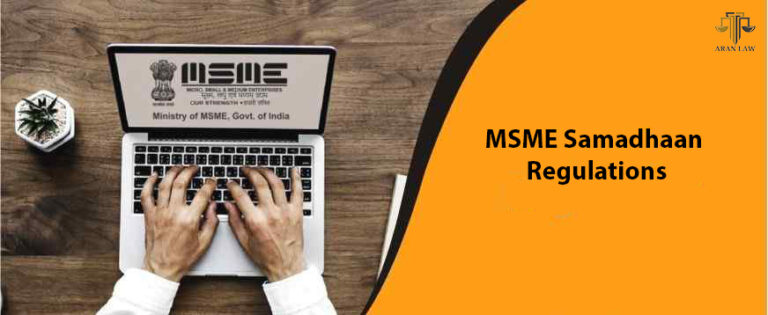MSME Samadhaan Proceedings Legal Compliance
Compliance with MSME Samadhaan regulations is not merely a procedural necessity but a vital step for small and medium enterprises seeking timely redressal for delayed payments, which can significantly impact their cash flow and overall financial health. The Micro, Small and Medium Enterprises Development (MSMED) Act, through the MSME Samadhaan portal, provides a streamlined mechanism for the filing of complaints related to delayed payments, ensuring that MSMEs have a platform to voice their concerns and seek expedited resolution.
Non-compliance with these regulations can have severe consequences for businesses, both from a legal and operational perspective. Legally, entities failing to adhere to the stipulated timelines for payment may find themselves embroiled in disputes that could lead to mandatory arbitration or court proceedings, potentially resulting in the imposition of fines, interest payments, and legal costs. This not only strains relationships with suppliers and partners but can also tarnish the reputation of the business in the industry and among consumers.
Read More: Best Strategies in Filing MSME Samadhaan Proceedings
Importance of Compliance with MSME Samadhaan Regulations
Compliance with MSME Samadhaan regulations ensures that businesses adhere to the established procedures and guidelines for resolving delayed payment disputes. It helps maintain fairness, transparency, and efficiency in the resolution process. By complying with these regulations, businesses can protect their rights, maintain legal standing, and maximize their chances of successful resolution.
By adhering to the prescribed procedures and guidelines, businesses not only safeguard their rights but also ensure their legal standing in potential disputes. This compliance is instrumental in fostering a business environment where transactions and dealings are conducted in a manner that is both equitable and transparent. It ensures that all parties involved have a clear understanding of the resolution process, thereby minimizing conflicts and facilitating smoother business operations.
Read More: How to Resolve Msme Samadhaan Payment Issues?
Consequences of Non-Compliance
Non-compliance with MSME Samadhaan regulations can have several adverse consequences for businesses. Let’s explore some of these consequences:
Rejection of Application
Non-compliance with the documentation and filing requirements specified by MSME Samadhaan can lead to the rejection of the application. Incomplete or inaccurate information, missing supporting documents, or failure to meet deadlines can result in the application being deemed ineligible. This can significantly delay or even prevent the resolution of the payment dispute.
The rejection of an application due to non-compliance effectively means losing a critical opportunity for legal redress under the MSME framework. This loss can force businesses to seek alternative, often more cumbersome and expensive, legal avenues to address their grievances, which may not be as tailored or advantageous as the MSME Samadhaan scheme.
To mitigate these risks, businesses must approach the MSME Samadhaan application process with meticulous attention to detail. This includes ensuring the completeness and accuracy of information, adherence to filing deadlines, and the inclusion of all necessary supporting documents. Leveraging legal expertise or consulting services that specialize in MSME regulations can also provide valuable guidance, improving the chances of application acceptance and facilitating a smoother resolution process.
Read More: What Are the Common Errors to Avoid in Msme Samadhaan Procedures?
Delayed Resolution
Failure to comply with MSME Samadhaan regulations not only complicates the payment dispute resolution process but also introduces significant operational and financial challenges for businesses involved. The MSME Samadhaan initiative is designed to support micro, small, and medium enterprises by providing a streamlined mechanism for addressing delayed payments, which are critical to maintaining their liquidity and operational viability. When businesses fall short of these compliance requirements, the consequences extend beyond mere procedural delays.
Read More: Why is It Crucial to Seek Legal Advice for Msme Samadhaan Claims?
Loss of Legal Protection
Compliance with MSME Samadhaan regulations provides businesses with legal protection during the resolution process. Non-compliance can weaken their legal position and result in the loss of certain rights and protections. This can leave businesses vulnerable to unfair practices, reduced bargaining power, and limited options for seeking redressal.
Missed Opportunities for Recovery
Missed opportunities for recovering delayed payments due to non-compliance with MSME Samadhaan regulations represent a significant setback for businesses, particularly for micro, small, and medium enterprises (MSMEs) that operate with limited financial buffers. The MSME Samadhaan scheme is specifically designed to provide a streamlined and efficient platform for addressing and resolving payment delays, which are critical challenges for MSMEs. However, failure to adhere to the established procedures and guidelines can severely undermine a business’s capacity to navigate this process successfully.
Read More: Importance of MSME Samadhaan
Damage to Business Reputation
Non-compliance with MSME Samadhaan regulations can harm a business’s reputation within the industry. It may signal a lack of professionalism, reliability, or commitment to fair business practices. This can negatively impact relationships with buyers, suppliers, and other stakeholders, leading to potential loss of business opportunities and trust.
Conclusion
Compliance with MSME Samadhaan regulations is crucial for businesses seeking resolution for delayed payment disputes. Non-compliance can result in the rejection of applications, delayed resolution, loss of legal protection, missed opportunities for recovery, and damage to business reputation. It is essential for businesses to familiarize themselves with the regulations, adhere to the prescribed procedures, and ensure accurate and timely submission of documentation. By complying with MSME Samadhaan regulations, businesses can strengthen their position, protect their rights, and increase the likelihood of a successful resolution to their payment disputes.
Read More: Clause (h) in section 43B of the IT Act – A Beacon of Hope for MSME | MSME Samadhaan Proceedings

